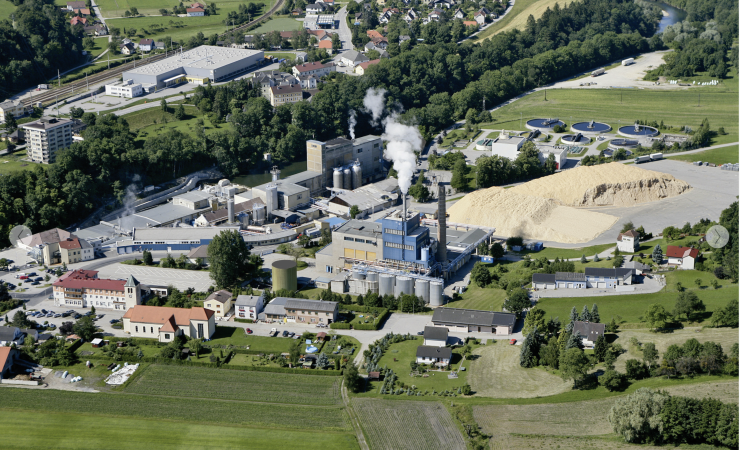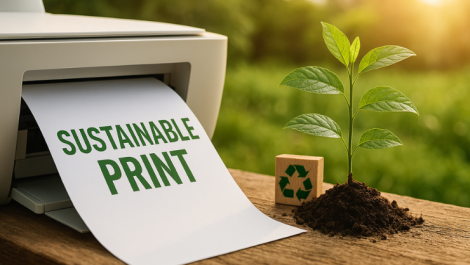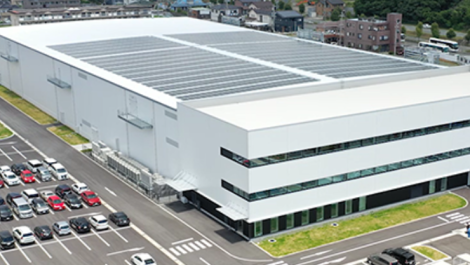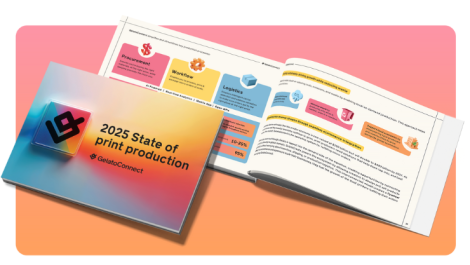Moves towards implementing more sustainable and less environmentally damaging practices are being made across the print supply chain, with various targets being hit ahead of schedule, from paper mills to press manufacturers to end-users, as demonstrated by a slew of recent announcements.
After being the first UK national paper merchant to validate its near-term carbon reduction target with the Science Based Targets initiative (SBTi), Denmaur has now used the same framework to validate its net-zero target date of 2045.
The net-zero target has committed Denmaur to reduce its total scope 1, 2 and 3 emissions by a minimum of 90% by 2045, with any remaining emissions being neutralised. This is in addition to its near-term target of reducing scope 1 and 2 emissions by 42% by 2030.
Denmaur’s marketing and sustainability director Danny Doogan explained why the company has nominated a date five years ahead of the global deadline first defined by the landmark Paris Agreement:
‘We targeted 2045 based on the net-zero work and aspirations of our customers as well as the decarbonisation plans and initiatives that are starting to come through from paper and board manufacturers.’
One such manufacturer is Burgo, which in 2023 announced plans to switch some of its mills into green paper plants, including Burgo Ardennes in Belgium, where Denmaur’s flagship Amadeus range is produced.
Mr Doogan explained further, ‘Our net-zero target may be considered ambitious, but during discussions with several manufacturers in the last year, it’s apparent there is a strong intent to reduce, and ultimately eliminate fossil fuel-based energy in paper production – a significant Scope 3 element of our carbon footprint. In the week where 2023 was confirmed as the hottest on record, now is the time for ambitious targets.’
Meanwhile, Mondi has announced an investment of €20 million to reduce greenhouse gas emissions, increase energy efficiency and strengthen operational safety at its Neusiedler mill. This includes an upgrade of the pulp mill´s recovery boiler, pulp dryer, steam accumulator and steam turbine. It is part of Mondi´s MAP2030 sustainability commitments.
‘These upgrades will help Mondi Neusiedler to reduce the pulp mil’s greenhouse gas emissions by over 20%, while also reducing NOx emissions by up to 10% and gas consumption by around 25%,” explained Sakari Eloranta, technical director uncoated fine paper at Mondi.
In the labels sector, UPM Raflatac has reported that all papers it sources, whether used as a face paper or a release liner in its labelling materials, are now certified under a credible third-party forest certification scheme. Having all its papers certified is one of UPM Raflatac’s 2030 responsible sourcing and climate targets, and has been achieved six years ahead of time.
‘Reaching our 2030 target this far in advance is a significant milestone that we could not have achieved without the support and close collaboration of our suppliers, and the drive and commitment of our employees. Third-party forest certification is one important element in our responsible sourcing approach, combined with supplier assessment and development activities, as well as continuous risk monitoring and management,’ said Maria Seppälä, VP sourcing at UPM Raflatac.
On the equipment manufacturing side, Epson has announced that as of December 2023, all electricity used at Epson Group sites around the world is from renewable sources, following a public commitment to do so made in March 2021. This makes it the first among Japanese domestic manufacturing industry to complete the transition to renewable electricity at all its sites worldwide, including Japan, the company says.
The Epson Group consumes approximately 876GWh of electricity per year. By sourcing renewables to cover this demand, Epson expects to reduce its annual carbon dioxide emissions by approximately 400,000 tonnes.
Epson global president Yasunori Ogawa said, ‘For eight decades, Epson has demonstrated a proactive approach to environmental action. We have maintained the founder’s commitment to preserving the cleanliness of nearby Lake Suwa and became the world’s first company to eliminate CFCs from our manufacturing processes.
‘Now we have successfully completed the switch to 100% renewable electricity at all Epson Group sites in just two years and ten months since declaring our commitment to doing so in 2021. This will not only help us to achieve our own goals but will also help to facilitate a broader adoption of renewable electricity within society by spreading awareness.’
At the user end, document automation specialist Datagraphic has announced its commitment to The Climate Pledge, a commitment by companies to reach net-zero carbon emissions by 2040, a decade ahead of the Paris Agreement’s 2050 goal.
Datagraphic says it is the only UK SME in its industry with net-zero targets approved and validated by the Science Based Targets initiative and pledges to reduce scope 1 and scope 2 GHG (greenhouse gas) emissions by 46% by 2030 from a 2019 base year and to measure and reduce scope 3 emissions.
Signatories to The Climate Pledge, which was co-founded by Amazon and Global Optimism in 2019, agree to measure and report greenhouse gas emissions regularly; to implement decarbonisation strategies in line with the Paris Agreement through real business changes and innovations, including efficiency improvements, renewable energy, materials reductions, and other carbon emission elimination strategies; and to neutralise any remaining emissions with additional, quantifiable, real, permanent and socially beneficial offsets to achieve net-zero annual carbon emissions by 2040.
Datagraphic’s achievements towards these goal include ISO 50001 and 14001 certification, installing over 310kW of solar generation capacity, working with suppliers on sustainable practices and conducting lifecycle assessments for all products or services.
Peter Wells, head of sustainability at Datagraphic, commented, ‘As one of the UK’s 5.5 million SMEs, sustainability is not just a choice but a responsibility. Net-zero won’t just happen. We need to be proactive, and Datagraphic is determined to lead the charge for our industry.’





